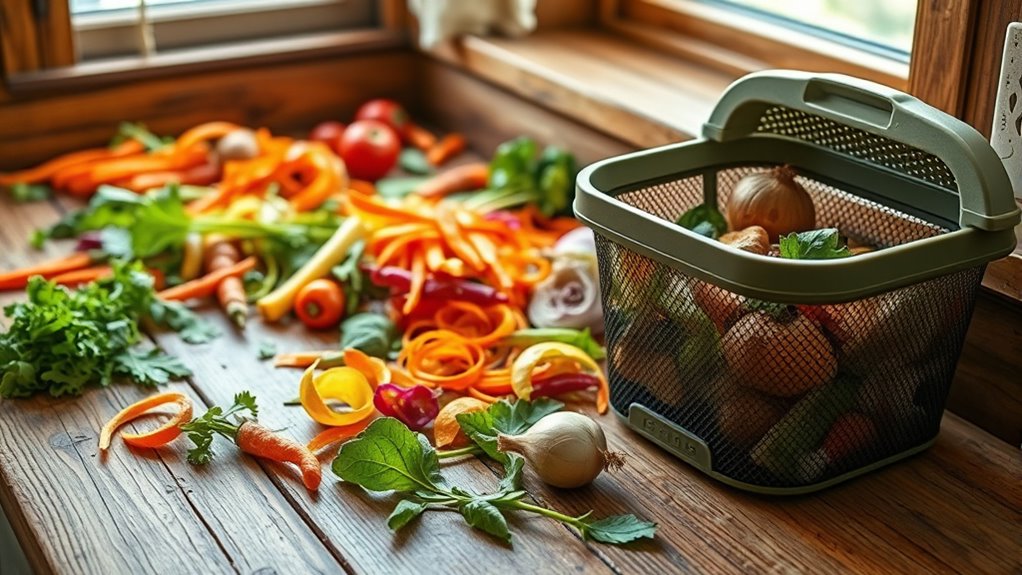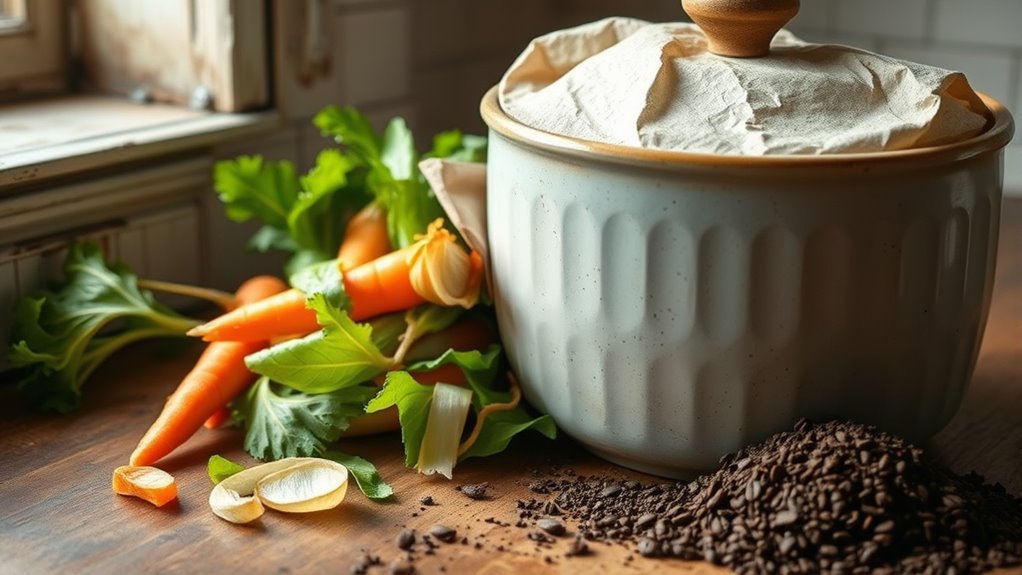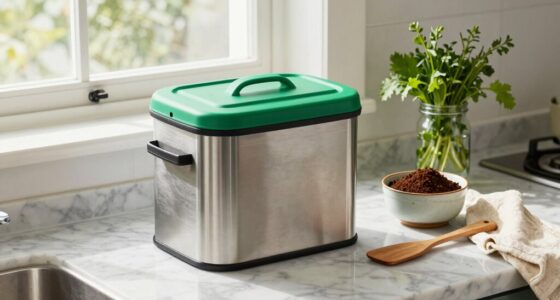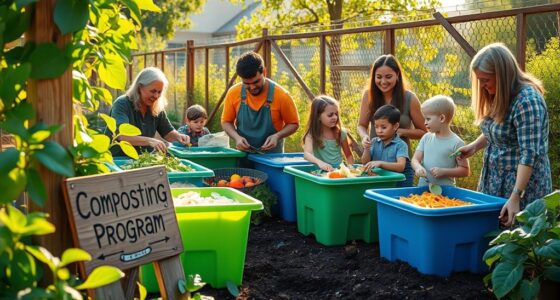To start composting kitchen scraps as a beginner, set up a worm bin with layers of bedding like shredded paper and add fruit and vegetable peels, coffee grounds, or plant-based waste. Keep the environment moist, avoid meat or dairy, and turn the contents regularly for airflow. This simple method reduces waste and produces rich compost for your garden. If you’re interested in mastering this easy, eco-friendly process, you’ll find more helpful tips below.
Key Takeaways
- Start with a simple worm bin using bedding materials like shredded paper and layered kitchen scraps.
- Feed worms plant-based kitchen waste such as fruit peels, vegetable scraps, and coffee grounds, avoiding meat and dairy.
- Maintain proper moisture and aeration by turning contents regularly and misting or adding bedding as needed.
- Monitor for odors or pests; remove unfinished scraps and ensure proper drainage and ventilation.
- Harvest nutrient-rich compost after a few months to enrich your garden or houseplants sustainably.

Composting kitchen scraps is a simple and effective way to reduce waste and enrich your garden. One popular method for beginners is worm composting, which uses red worms to break down organic waste quickly and efficiently. Worm composting, also called vermicomposting, is ideal if you’re short on space or want to compost indoors. To get started, you’ll need a compost bin designed for worms—these bins usually have multiple levels for easy separation of finished compost from active worms. When setting up your worm bin, guarantee it has proper drainage and ventilation to prevent excess moisture and odors. Layer your kitchen scraps—fruit peels, coffee grounds, vegetable scraps—on top of bedding material like shredded paper or coconut coir to keep the environment healthy for your worms. As you add scraps, avoid overfeeding and monitor moisture levels; your worms need a moist but not soggy habitat. Regularly check your worm bin to maintain ideal conditions, which is vital for successful composting and preventing foul smells. This process is straightforward once you establish a routine, and you’ll start seeing rich, dark compost in a few months, perfect for enriching your garden soil.
Maintaining your compost bin is key to guaranteeing smooth operation and healthy worm activity. Compost bin maintenance involves routinely turning or mixing the contents to aerate the mixture, which helps speed up decomposition and prevents unpleasant odors. Keep an eye on moisture levels—if it’s too dry, lightly mist with water; if it’s too wet, add more bedding material to absorb excess moisture. Always avoid adding meat, dairy, or oily foods, as these can attract pests and create odors, disrupting your composting process. Instead, focus on plant-based kitchen scraps and browns like shredded paper or dried leaves to balance nitrogen and carbon inputs. Over time, the worm bin will produce finished compost that looks like dark, crumbly soil. Harvest this compost carefully, removing the worms and any unfinished scraps, then use it to improve your garden beds or potted plants. Proper compost bin maintenance not only keeps the environment inside the bin healthy but also extends the lifespan of your worm composting setup.
Frequently Asked Questions
Can I Compost Cooked Food Scraps?
Yes, you can compost cooked food scraps, but it’s not always ideal. Cooked food can attract pests and slow down the composting process if not managed properly. To compost cooked food scraps effectively, chop them into small pieces, bury them deep in your compost pile, and balance them with plenty of greens and browns. This helps guarantee the composting process stays active and odor-free.
How Long Does It Take for Compost to Mature?
It typically takes about 3 to 6 months for compost to reach maturity, depending on factors like temperature, moisture, and aeration. During this soil enrichment process, you’ll notice the compost becomes dark, crumbly, and earthy-smelling. To speed up the compost maturity timeline, turn it regularly and keep it moist. Mature compost enhances your garden’s soil, providing essential nutrients that support healthy plant growth.
Is There a Smell Associated With Composting?
Yes, composting can produce a smell if not managed properly. To minimize odor, guarantee proper odor control by balancing green and brown materials and aerating your compost regularly. Place your compost bin in a well-ventilated spot away from your home to prevent odors from becoming bothersome. Keeping the bin covered and adding carbon-rich materials helps reduce smells, making composting a pleasant and eco-friendly experience.
What Should I Do if Pests Are Attracted?
Think of your compost as a peaceful garden oasis, not a snack bar for pests. If pests are attracted, you should tighten pest prevention by covering your compost with a layer of carbon-rich materials like leaves or shredded paper. Regularly turn your compost to mix in attractant control, which helps disperse smells and deters pests. Keep your compost bin sealed tightly to maintain a pest-free environment and enjoy a healthier, happier compost.
Can Composting Reduce Household Waste Significantly?
Yes, composting kitchen scraps can substantially reduce household waste. When you turn scraps into compost, you create nutrient-rich garden mulch that improves soil enrichment. This process diverts waste from landfills, reducing methane emissions and environmental impact. You’ll notice less trash to manage, and your garden benefits from healthy, natural amendments. Regular composting makes a sustainable cycle, helping you minimize waste while nurturing your garden’s health.
Conclusion
Now that you’ve started composting your kitchen scraps, you’re nurturing the earth like a caring gardener tending to delicate seedlings. Every peel and leftover becomes a tiny treasure that transforms into rich, nourishing soil, whispering promises of future growth. Think of your compost bin as a magic pot—feeding nature’s cycle with your everyday waste. With each turn, you’re not just reducing trash; you’re planting seeds of sustainability, making the world a little greener, one scrap at a time.









